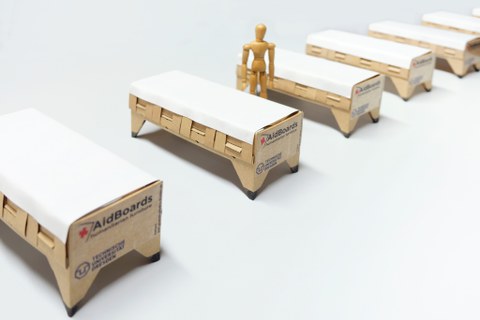Sep 23, 2020
A cardboard bed: TUD researchers develop sustainable furniture for humanitarian aid
Droughts, migration, epidemics: When emergency shelters or hospitals are built in humanitarian catastrophes, aid workers quickly need a large number of beds. Usually, field beds made of plastic and metal are used, which are discarded after use. This aggravates the already existing, considerable waste problems in disaster situations. In addition, the beds are costly produced in the Far East, before being delivered to the areas of operation via long logistics chains in Europe.
In the "AidBoards" project, researchers led by graduate engineer Sven Gille from TU Dresden’s Chair of Wood Technology and Fibre Materials Technology have developed an alternative: disposable medical beds made from renewable raw materials, which are not only environmentally friendly and inexpensive to produce, but also easy to dispose of. The project brought together a Saxon manufacturer of medical products, a logistics consultant for humanitarian aid and the packaging producer THIMM. From 2018 to 2020, the project was funded by the Federal Ministry of Education and Research as part of the competition "Innovative Products for the Bioeconomy".
Initially, TUD researchers experimented with wood, but cardboard proved to be the more suitable material: cheaper, lighter and even more sustainable. "We set ourselves very ambitious targets. For a year, we adopted the design time and again", says Gille. The result is a two-metre long and one metre wide cardboard bed, which can be delivered to the crisis area as a set and assembled there in a few simple steps, without any tools, nails or screws. The cotton or jute cover can be easily changed for the next user to save disinfectant. After use, the helpers can recycle the cardboard bed, compost it or burn it virtually CO2-neutral.
In October 2019, the start-up corrugAid was founded to bundle the expertise in production, sales and design. The name is derived from the English verb corrugate. On the basis of the prototype, the market launch of the beds is scheduled for 2020. "We are in current negotiating, among others with partners in humanitarian aid", says Maurice Jedlicka from corrugAid. They are ready for production. Even though TUD is not involved in the start-up, the Dresden researchers continue to support corrugAid with their knowledge. They are currently in the process of registering a DIN standard for furniture made of corrugated cardboard.
Meanwhile, research on sustainable cardboard products continues at the Chair of Wood Technology and Fibre Materials Technology. "Novel concepts have been developed as part of the student work. We are currently developing sustainable chairs and tables, including cardboard operating tables for disaster control", says Gille. He can also imagine his own spin-off company. He is searching for interested investors and partners. After all, research should not end up hidden in a drawer - but where humanitarian aid is most needed.
Media enquiries
Sven Gille
Fakultät Maschinenwesen
Institut für Naturstofftechnik
Lehrstuhl für Holztechnik und Faserwerkstofftechnik
Tel.: +49 351 463-37926

